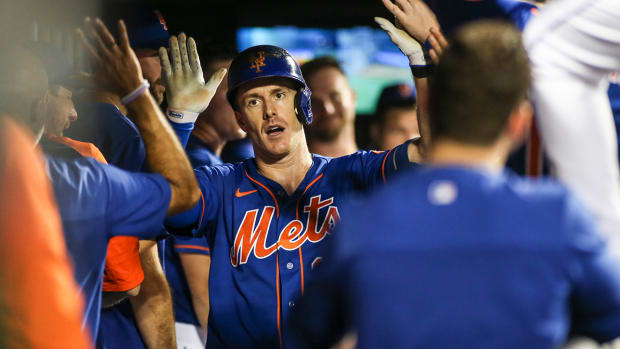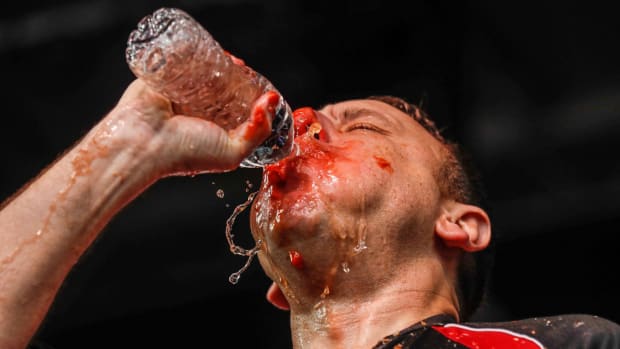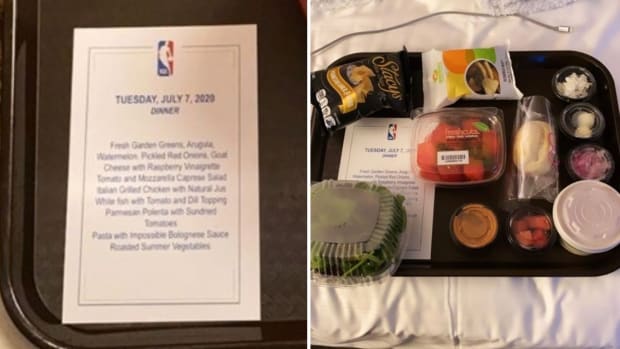Why I’m So Thankful for All the Good Sports on ‘The Great British Bake Off’
By the time I finally got around to watching it last year, my family and friends had been telling me to watch The Great British Bake Off for what seemed like decades. “The contestants are so kind to each other!” they’d say. “It’s so refreshing!” The description didn’t grab me—a bunch of regular people baking in a tent in the heat of an English summer? And just, like, being nice to each other as they spread jam on scones? I couldn’t see how it would be remotely interesting.
There was a time in my life where this would’ve seemed right up my alley. My first job was at America’s Test Kitchen, the television show associated with the Cook’s Illustrated and Cook’s Country magazines. For two years, I produced videos, ran the blogs, wrote newsletters, researched recipes, and watched people knead bread, sear steaks, melt chocolate, chop onions, and blind-bake pie crusts in the test kitchen every day. I’d always loved cooking; I grew up cooking with my mother, and most days when I came home from school we’d bake her famous applesauce muffins, or build pizzas, or make pasta from scratch. She made every recipe in Julia Childs’ Mastering The Art of French Cooking in the 1970s. When we saw the movie Julie and Julia, about a woman who also makes her way through Childs’ book, my mother left the theater shaking her head. Boning a duck isn’t that hard.
But working in the food industry slowly killed my passion for making food. When you work for a publication that caters to home cooks, you really have to care whether Susie in Oklahoma or John in Seattle or whomever in wherever burns her or his broccoli. I didn’t. I once made a video demonstrating a recipe for making kale chips in the microwave, and a not-small-amount of viewers wrote angry emails saying they’d tried it and their microwaves caught on fire. I wasn’t terribly alarmed, which was a sign. I knew it was time to leave and started weaseling my way into sportswriting.
For years after that first job, I ached to get my love of cooking and baking back. I’d gone from delighting in developing recipes to grabbing a salad or a sandwich on the way home from work because I didn’t have any interest in making them for myself. And then I found The Great British Bake Off.
My god. That show is art (and sports). A few years ago, the program switched from BBC to Channel 4, and because of politics that I won’t get into here, three of the show’s four main hosts and judges left (email me if you want my in-depth analysis of Mary, Mel, Sue and Paul’s break-up). But even with three new faces, the show has remained just as effective. And the mark of truly brilliant reality television is a format that works regardless of who’s associated with it.
The contestants compete in baking intricate, wildly difficult recipes over a 10-week span. These people are not professionals but amateurs chosen after a rigorous interview and screening process. They’re all different ages, genders, sexual orientations, races, and income-levels. The episodes are edited so that their personalities shine through; you come to love Nadia for her intensity, Nancy and Ruby for their dry senses of humor, Richard and Luis for their calm, lovely demeanor, Liam for his charisma, Frances and Kim-Joy for their incredible design sense...I could go on.
What’s most interesting to me about the show is the spirit of the competition. You think I’m joking when I say The Great British Bake Off is sports? I’m not. It is. Just a kinder version of the cutthroat, win-at-all-costs culture that surrounds not only professional leagues but also most competitive reality shows. As has been said before in almost every article and conversation you’ve ever had about GBBO, the contestants like each other. They’re kind to each other. They help each other. They are supportive while still being competitive, determined without letting their own ambition pull others down. The show’s motto might as well be: “A rising cake lifts all bakers.”
The show immediately became my escape when I finally started watching it last winter. Sports are usually this respite for me, but at the time I needed something that wasn’t related to my job or anyone I knew to disappear in 50 minutes at a time.
A tent in the English countryside proved perfect. Within weeks, I’d plowed through every season available on Netflix. The theme song alone—a sprinkling tune that floats over B-roll of cakes, children, eggs, ovens, and raspberries—is audio-visual Xanax. It was healing to turn on my TV and watch contestants develop relationships with each other and become more self-confident as the episodes progressed. I felt like I knew them. But it also made me rethink the way I interact with people. I felt myself becoming gentler. It was like the show tapped into a soft spot of mine that had become calloused and guarded. Rather than deciding who was Good or Bad, I began allowing people on my life to exist as I was able to accept them on the show: as imperfect characters who sometimes annoyed me and sometimes didn’t. Whose choices I sometimes agreed with and sometimes didn’t. Who were there not for me to judge, but to root for. Because that’s what everyone on my screen was doing. I often fail at all of this, but the show honestly helps me try.
It also helped me love making food again. The bakers are so inventive and it’s inspiring, so I’m slowly getting back into cooking and baking. I once again enjoy the feeling of dough springing up beneath my hands, of knocking the bottom of a sturdy pie crust, of stirring melted chocolate until all the chips dissolve into a glossy spread. I can’t wait for Thanksgiving, when I’ll go home and make some bizarre dessert that my mother will laugh at, and that will be too ambitious and maybe terrible.
Netflix just added another season last week, and I just finished it. I have never watched a season finale without crying. These people work so hard, and prove to themselves, their friends and family how talented and driven they are. All they get for winning is an engraved pie plate (okay, and thousands and thousands of Instagram followers, but it’s the spirit of the thing, you know?).
More than anything, the show’s wild success and rabid following gives me hope that rather than sinking to the lowest common denominator, there’s a market for content and programming that’s compelling and brings out the best in people without being saccharine, artificial, or manipulating. The contestants and hosts are all authentic, and that’s what audiences connect to. They’re open and vulnerable. Grown men cry over bread. Women laugh at broken eggs that crack open like your hardened heart as you click “begin next episode” when the previous one ends.
This Thanksgiving, I’m thankful for that ethos of generosity and compassion. Not only as it exists on a sweet British show, but in all the places it manifests itself in my private life and—however infrequently these days—in the broader world. I’m thankful for those who lift up rather than punch down. For everyone who says the thoughtful but difficult thing over the dismissive and easy one. For everyone who chooses empathy over cruelty. And it’s lovely to know that when I start to forget this spirit exists, there are brave Brits making madeleines in a damp tent just a remote-click away. They all remind me that kindness, unlike flour and sugar, cannot be measured.




